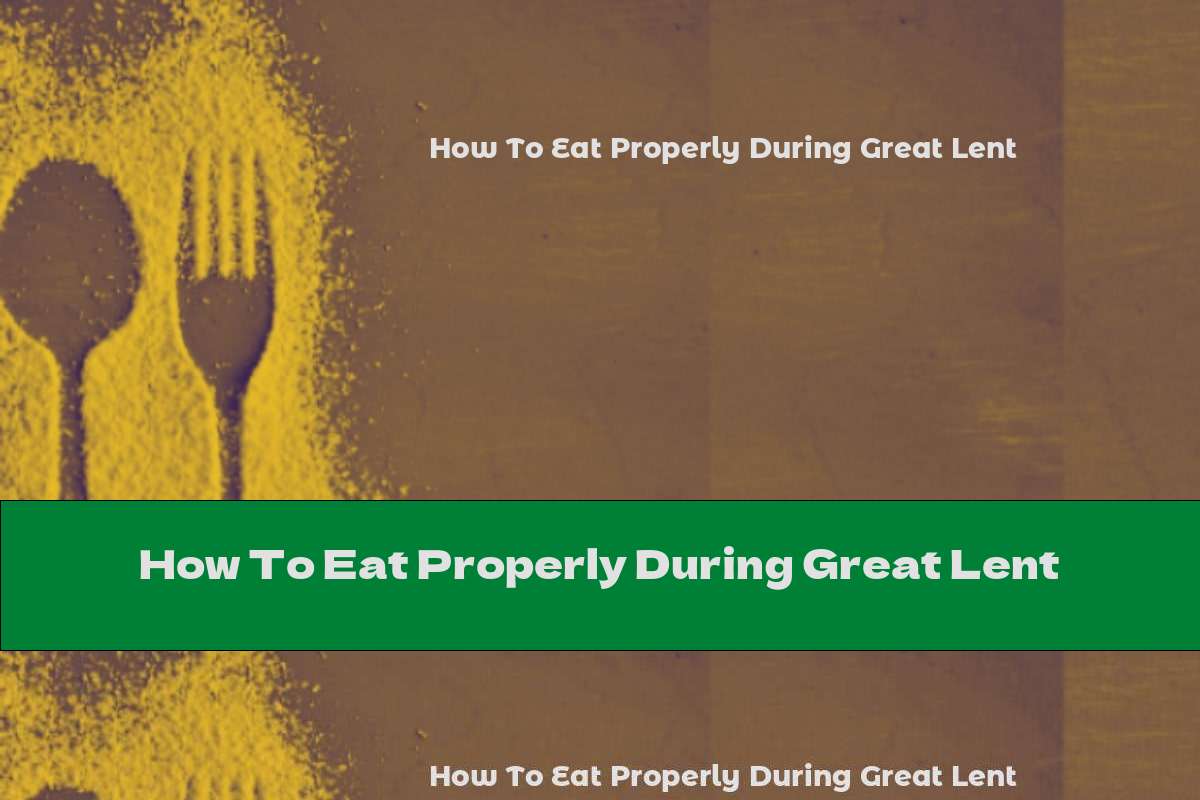How To Eat Properly During Great Lent
 Author: Maryam Ayres
Time for reading: ~3
minutes
Last Updated:
February 17, 2026
Author: Maryam Ayres
Time for reading: ~3
minutes
Last Updated:
February 17, 2026

Remember, fasting is not fasting or a diet (although many people use this period precisely to lose weight), but a period of spiritual cleansing. However, it is better to contact a priest for explanations of the religious meaning of fasting. And in this article we will talk about how to properly observe fasting from the point of view of healthy eating.
Great Lent has begun . You can start fasting at any time, but priests advise to reconcile with loved ones, forgive offenses and establish peace in relationships before doing so.
Priests emphasize that it is better to observe the fast not so strictly, but at the same time remain kind and loving, than to endure the entire fast without eating a single egg, but constantly quarrel and be in a bad mood.
Remember, fasting is not fasting or a diet (although many people use this period precisely to lose weight), but a period of spiritual cleansing. However, it is better to contact a priest for explanations of the religious meaning of fasting . And in this article we will talk about how to correctly observe fasting from the point of view of healthy nutrition .
Forbid
Fruits and vegetables have long been considered the basis of a fasting menu: they can be eaten raw, boiled, baked, mashed - consumed in any form. Eating in this way, of course, it is difficult to provide the body with the necessary supply of proteins, however, you will get a lot of carbohydrates, vitamins, organic substances, acids and fiber.
Everyone who is fasting should exclude the following products from their diet :
-
Alcohol.
-
Meat, poultry and any meat products .
-
Eggs
-
Milk and all dairy products (cheese, sour cream, yogurt, kefir).
-
Accordingly, all products containing one of the ingredients listed above are also excluded (for example, mayonnaise made on the basis of egg yolk, chocolate containing milk).
-
Vegetable oil, fish and seafood can be consumed during fasting , but only on certain days.
to allow
Everything is quite simple here. During fasting you can eat:
-
Any fruits and vegetables (fresh, canned or cooked). Pay attention to the word any: you can eat not only potatoes, carrots and beets, but also cauliflower, broccoli, eggplants, zucchini, corn, peas, peppers.
-
Cereals: rice, buckwheat, oatmeal, bulgur, etc. Both breakfasts and soups (based on vegetable broth) can be prepared on the basis of cereals.
-
Dried fruits
-
Nuts
-
Mushrooms
-
Legumes (peas, lentils, beans, chickpeas).
-
Soy products .
-
Bread that does not contain eggs or dairy products .
Degrees of severity of fasting
There is a special monastery statute, which describes the specifics of food for each day of fasting :
-
Especially strict fasting : complete abstinence from food - for example, on the first day of the first week of Great Lent or on Good Friday.
-
Dry food: cold food without oil, brown bread, water, vegetables, salads, fruits, compotes, pickles without oil, nuts, raisins, honey, smoothies with soy milk.
-
Hot food without oil: soups, boiled and stewed vegetables, porridge on water (only on Tuesday and Thursday).
-
Hot food with vegetable oil, soups, wine (only on Saturday and Sunday), vegetable salads, second courses.
-
Fish can be eaten only 2 times during Lent : on Annunciation and Palm Sunday. You can eat caviar on Lazarus Saturday.
However, this statute is written specifically for monks, and lay people, that is, ordinary people, should observe fasting as much as possible.
Related Articles
- Pregnancy Food Pyramid: A Guide to Healthy Eating During Pregnancy
- Winter Nutrition: Tips for Staying Healthy During the Colder Months
- Winter Nutrition: Tips for Staying Healthy During the Colder Months
- Winter Nutrition: Stay Healthy and Nourished During the Cold Season
- Do-it-yourself Valentine's Day Chocolates
Top Nutrition Articles Today
- . Nutrition Trends for 2026: Superfoods, Recipes, and Balanced...
- . Nutrition Trends 2026: Diet Plans, Recipes, and Wellness Tip...
- . The Role of E249 in Nutrition: Health Effects, Safety, and A...
- . Paradise Apple - Benefits And Harms To Health
- . How To Fillet Mackerel
- . The Power of Rye: Nutritional Benefits and Health Effects
- . Granadilla - Health Benefits
- . How To Salt Nettles
- . 7-day Diet With Eggs
- . The Benefits of Myra E: A Powerful Vitamin E Supplement